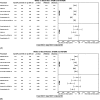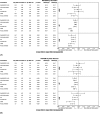Race and Sex Differences in Management and Outcomes of Patients After ST-Elevation and Non-ST-Elevation Myocardial Infarct: Results From the NCDR
- PMID: 27468142
- PMCID: PMC6490713
- DOI: 10.1002/clc.22570
Race and Sex Differences in Management and Outcomes of Patients After ST-Elevation and Non-ST-Elevation Myocardial Infarct: Results From the NCDR
Abstract
Background: Race and sex have been shown to affect management of myocardial infarction (MI); however, it is unclear if such disparities exist in contemporary care of ST-segment elevation myocardial infarction (STEMI) and non-ST-segment elevation myocardial infarction (NSTEMI).
Hypothesis: Disparities in care will be less prevalent in more heavily protocol-driven management of STEMI than the less algorithmic care of NSTEMI.
Methods: Data were collected from the ACTION Registry-GWTG database to assess care differences related to race and sex of patients presenting with NSTEMI or STEMI. For key treatments and outcomes, adjustments were made including patient demographics, baseline comorbidities, and markers of socioeconomic status.
Results: Key demographic variables demonstrate significant differences in baseline comorbidities; black patients had higher incidences of hypertension and diabetes, and women more frequently had diabetes. With few exceptions, rates of acute and discharge medical therapy were similar by race in any sex category in both STEMI and NSTEMI populations. Rates of catheterization were similar by race for STEMI but not for NSTEMI, where both black men and women had lower rates of invasive therapy. Rates of revascularization were significantly lower for black patients in both the STEMI and NSTEMI groups regardless of sex. Rates of adverse events differed by sex, with disparities for death and major bleeding; after adjustment, rates were similar by race within sex comparisons.
Conclusions: In this contemporary cohort, although there are differences by race in presentation and management of MI, heavily protocol-driven processes seem to show fewer racial disparities.
Keywords: Acute coronary syndrome; Disparities in Care; Gender; NSTEMI; Race; STEMI.
© 2016 Wiley Periodicals, Inc.
Figures


References
-
- Anderson JL, Adams CD, Antman EM, et al. ACC/AHA 2007 guidelines for the management of patients with unstable angina/non–ST‐elevation myocardial infarction: a report of the American College of Cardiology/American Heart Association Task Force on Practice Guidelines (Writing Committee to Revise the 2002 Guidelines for the Management of Patients With Unstable Angina/Non ST‐Elevation Myocardial Infarction): developed in collaboration with the American College of Emergency Physicians, the Society for Cardiovascular Angiography and Interventions, and the Society of Thoracic Surgeons: endorsed by the American Association of Cardiovascular and Pulmonary Rehabilitation and the Society for Academic Emergency Medicine [published correction appears in Circulation. 2008;117:e180]. Circulation . 2007;116:e148–e304. - PubMed
-
- Kushner FG, Hand M, Smith SC Jr, et al. 2009 focused updates: ACC/AHA guidelines for the management of patients with ST‐elevation myocardial infarction (updating the 2004 guideline and 2007 focused update) and ACC/AHA/SCAI guidelines on percutaneous coronary intervention (updating the 2005 guideline and 2007 focused update): a report of the American College of Cardiology Foundation/American Heart Association Task Force on Practice Guidelines [published corrections appear in J Am Coll Cardiol. 2009;54:2464 and 2010;55:612]. J Am Coll Cardiol . 2009;54:2205–2241. - PubMed
-
- Hoekstra JW, Pollack CV, Roe MT, et al. Improving the care of patients with non–ST‐elevation acute coronary syndromes in the emergency department: the CRUSADE Initiative. Acad Emerg Med. 2002;9:1146–1155. - PubMed
-
- Marciniak TA, Ellerbeck EF, Radford MJ, et al. Improving the quality of care for Medicare patients with acute myocardial infarction: results from the Cooperative Cardiovascular Project. JAMA. 1998;279:1351–1357. - PubMed
-
- Spertus JA, Radford MJ, Every NR, et al. Challenges and opportunities in quantifying the quality of care for acute myocardial infarction: summary from the Acute Myocardial Infarction Working Group of the American Heart Association/American College of Cardiology First Scientific Forum on Quality of Care and Outcomes Research in Cardiovascular Disease and Stroke. Circulation. 2003;107:1681–1691. - PubMed
Publication types
MeSH terms
LinkOut - more resources
Full Text Sources
Other Literature Sources
Medical

